TL;DR In my application there are 2 parts. First, part is API which only serves data (has multiple GET endpoints). Second, the event consumer consumes from pubsub and writes to db. I am using sync DB for event consumer and async db for API. My code works perfectly fine but tests are failing. In my tests, I insert data using a sync session, then try to get with an async session. However, I get no data returned when I call API using async client (which uses async db). Can you help me to find out the problem?
Edit: I think I need to start async engine from savepoint that sync engine lastly created after inserting all data. Is there a way to pass savepoint to another fixture?
I read at multiple resources and thought that if I create client,db for sync and async, use recipe for Joining a Session into an External Transaction and add my data using sync db session and use async client with async db to query data I will have proper result. But, it seems like I am missing something. Because after I insert I add pdb.set_trace() and check db, data seems to be inserted. However, after switching to async client db seems empty. Since my query results are empty. You can find the code I used below. I think problem is related to my configuration in conftest, if you need more code or any extra information I will share it right away!
conftest.py
import sqlalchemy as sa
from fastapi.testclient import TestClient
from sqlalchemy.orm import sessionmaker
from sqlalchemy.ext.asyncio import create_async_engine, AsyncSession
from httpx import AsyncClient
import pytest
@pytest.fixture(scope="session")
def engine(config: TestConfig):
return sa.create_engine(config.DATABASE_URL)
@pytest.fixture(scope="session")
def async_engine(config: TestConfig):
return create_async_engine(
config.ASYNC_DATABASE_URL, pool_size=10, echo=True, max_overflow=10
)
@pytest.fixture(scope="session")
def TestingSessionLocal(engine):
return sessionmaker(
autocommit=False,
autoflush=False,
bind=engine,
)
@pytest.fixture(scope="session")
def TestingSessionLocalAsync(async_engine):
return sessionmaker(
bind=async_engine,
autoflush=False,
future=True,
class_=AsyncSession,
expire_on_commit=False,
)
@pytest.fixture
def db(engine, TestingSessionLocal):
connection = engine.connect()
transaction = connection.begin()
session = TestingSessionLocal(bind=connection)
session.begin_nested()
@sa.event.listens_for(session, "after_transaction_end")
def end_savepoint(session, transaction):
if transaction.nested and not transaction._parent.nested:
session.begin_nested()
yield session
# Rollback the overall transaction, restoring the state before the test ran.
session.close()
transaction.rollback()
connection.close()
@pytest.fixture
async def async_db(async_engine, TestingSessionLocalAsync):
async with async_engine.connect() as conn:
await conn.begin()
await conn.begin_nested()
async_session = TestingSessionLocalAsync()
@sa.event.listens_for(async_session.sync_session, "after_transaction_end")
def end_savepoint(session, transaction):
if conn.closed:
return
if not conn.in_nested_transaction():
conn.sync_connection.begin_nested()
yield async_session
await async_session.close()
await conn.close()
@pytest.fixture
def app(config):
return create_app(config)
@pytest.fixture
def client(app, db):
def override_get_db():
yield db
app.dependency_overrides[get_db] = override_get_db
yield TestClient(app)
del app.dependency_overrides[get_db]
@pytest.fixture()
async def async_client(app, async_db):
def override_get_async_db():
yield async_db
app.dependency_overrides[get_async_db] = override_get_async_db
async with AsyncClient(
app=app,
base_url="http://localhost:8080",
headers={"Content-Type": "application/json"},
) as client:
yield client
del app.dependency_overrides[get_async_db]
test.py
@pytest.mark.asyncio
async def test_thing(async_client, db: Session):
thing = Thing()
db.add(thing)
db.flush()
db.refresh(thing)
# db.commit() # Tried adding db.commit() here result has not changed
res1 = await async_db.execute(select(thing.name).select_from(thing))
res2 = db.execute(select(thing.name).select_from(thing))
pdb.set_trace()
get_thing = await async_client.get(
f"/thing/{thing.id}",
)
assert len(get_thing) == 1
pdb result
It basically fails in assert line in test.py outputing len(get_thing) is 0.
